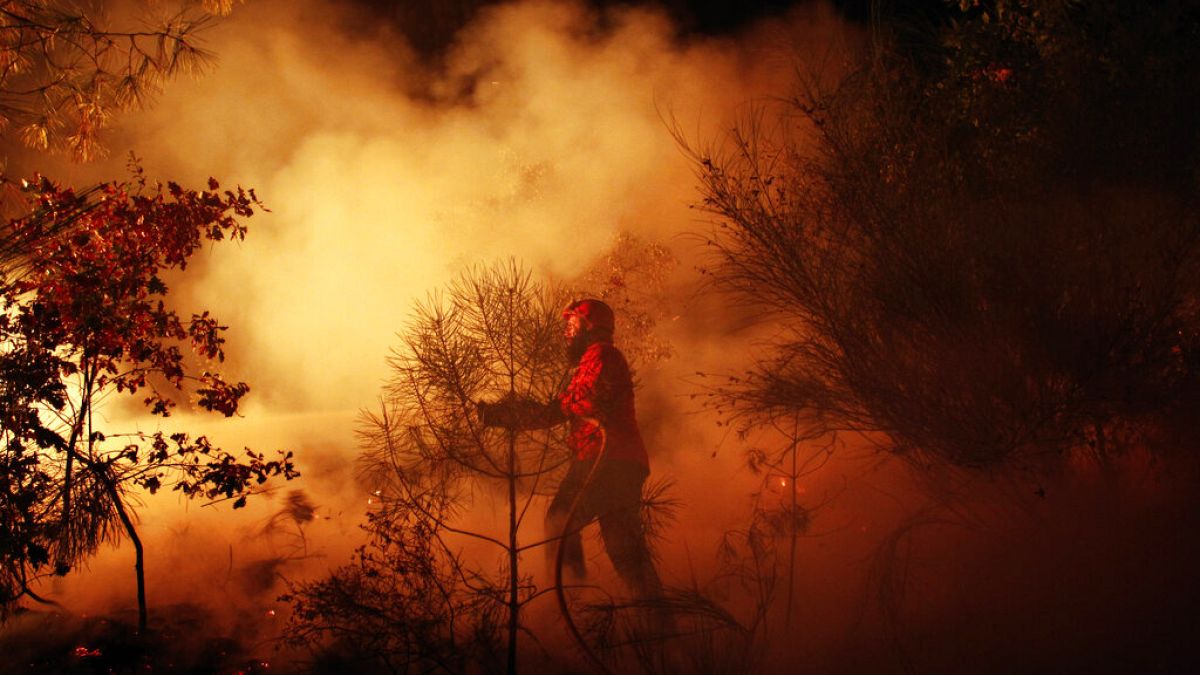Portugal is currently facing a severe wildfire crisis, with almost 1,600 firefighters deployed to battle fires in 20 different areas on Monday. The Aveiro district has been particularly hard-hit, prompting the Portuguese government to request assistance from the European Commission under the Civil Protection Mechanism. The Commission can provide additional resources such as firefighters, water bombers, and helicopters, as well as satellite imagery from the Copernicus system to track fires on the ground. Several homes have been destroyed, with one neighborhood in Albergaria-a-Velha evacuated and multiple motorways closed due to the fires.
In Albergaria-a-Velha, a fire that started in the neighboring municipality of Sever do Vouga has caused massive destruction, with several houses catching ablaze. Four people have been injured, traffic to three major motorways has been cut off, and school classes have been canceled. The town’s mayor, António Loureiro, has issued a warning to the population to stay safe as multiple fires continue to rage in the region. Oliveira de Azemeis, south of Porto, is facing the largest blaze, with over 500 firefighters working tirelessly to contain the fire. Tragically, a firefighter from the São Mamede Infesta fire brigade lost his life after suffering a cardiopulmonary arrest while battling fires in Oliveira de Azeméis.
The situation in Portugal remains critical, with the entire mainland on alert until Tuesday due to the high risk of fire outbreaks. Several blazes are still active, including those in Sever do Vouga and Oliveira de Azeméis. The fires have caused significant damage to homes, infrastructure, and natural habitats, underscoring the urgency of the situation. The government and local authorities are working tirelessly to control the blazes and ensure the safety of residents and firefighters. The devastating impact of the wildfires serves as a stark reminder of the ongoing threat of fires in Portugal, particularly during periods of high temperatures and strong winds.
The European Commission’s activation of the Civil Protection Mechanism highlights the international collaboration needed to combat wildfires effectively. By providing additional resources and support, the Commission is assisting Portugal in its efforts to contain the fires and protect vulnerable communities. The use of satellite imagery from the Copernicus system also demonstrates the importance of advanced technology in monitoring and tracking fires on the ground. As climate change continues to exacerbate wildfire risk, cooperation at both national and international levels is crucial in mitigating the impact of fires and ensuring rapid response to emergencies.
The loss of life among firefighters underscores the dangers and challenges faced by those on the frontlines of wildfires. The bravery and dedication of these individuals in risking their lives to protect others and combat the blazes are commendable. Their sacrifice serves as a poignant reminder of the human cost of wildfires and the need for adequate resources, training, and support for firefighting personnel. As Portugal mourns the loss of a firefighter and grapples with the aftermath of devastating fires, the country is reminded of the resilience and unity needed to overcome such crises and rebuild communities.
In the wake of the wildfires, support and solidarity from within Portugal and across Europe are essential in assisting affected communities and facilitating recovery efforts. The collective response to the crisis underscores the importance of unity and cooperation in times of emergency. As Portugal continues to battle the blazes and assess the damage caused by the fires, collaboration at all levels of government, civil society, and international partners will be crucial in addressing the immediate needs of those affected and developing long-term strategies to prevent future wildfire disasters. By coming together to support one another and mobilize resources effectively, Portugal and its partners can work towards rebuilding communities, protecting the environment, and enhancing resilience against the growing threat of wildfires in the future.










